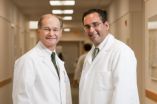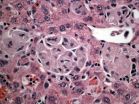(Press-News.org) ANN ARBOR, Mich. – Millions worldwide die each year because they can't afford a pacemaker. Meanwhile heart patients in the United States say they'd be willing to donate theirs after death to someone in need.
In the current issue of Circulation, experts at the University of Michigan Cardiovascular Center examine the legality and logistics of collecting pacemakers, after they are removed for burial or cremation, for sterilization and reuse across the globe.
Small humanitarian efforts have shown reusing pacemakers is safe and effective with little risk of infection and patients live as long, and as well, with a recycled pacemaker as those who get new ones, authors say.
It's a novel approach for treating cardiovascular disease which remains the world's leading cause of death.
"Establishing a validated pacemaker reutilization program could transform a currently wasted resource into an opportunity for a new life for many citizens in the world," says study senior author Kim A. Eagle, M.D., cardiologist and a director of the U-M Cardiovascular Center.
Each year 1 million to 2 million people worldwide die due to lack of access to pacemakers. But 84 percent of patients surveyed at the UM would donate their pacemaker for reuse.
Through partnerships, the U-M hopes to make the concept of recycling pacemakers a life-saving reality for those who cannot afford them.
Pacemakers are implanted to correct a slow heartbeat. A slow heart rate can be caused by heart attacks, conductive diseases or old age and lead to fainting and fatigue.
Some foreign manufacturers have reduced the cost of pacemakers to as little as $800, a price that still makes it out of reach in poor nations.
"Despite the substantial cost reduction, a new pacemaker is often more than the annual income of the average worker in underdeveloped nations," Eagle says.
Poor nations have not been able to afford the electrophysiology technology that has reduced cardiac deaths in industrialized nations, while unhealthy lifestyle, as well as infectious diseases, contribute to escalating rates of heart disease worldwide.
In recent decades, industrialized nations have seen a drop in deaths from heart attacks and strokes, but those in low- and middle-income nations continue to experience an epidemic of cardiovascular disease.
For instance, in South America and Central America, the parasitic infection Chagas disease can disrupt connections in the heart. Chagas can affect 20 million people, and a study revealed that 72 percent pacemaker recipients in Brazil had been infected at some point in their lives.
Growing evidence and support laid the groundwork for Project My Heart¬—Your Heart, a collaborative between citizens, physicians and funeral directors of Michigan, the U-M Cardiovascular Center and World Medical Relief, Inc., a Detroit-based non-profit organization that specializes in the delivery of used medical equipment.
Pacemakers removed before burial or cremations are rarely returned to the manufacturer and instead are stored at funeral homes with no apparent use. In a U-M survey of Michigan funeral home directors 89 percent said they were willing to donate devices to charitable organizations if given the opportunity.
A model program
According to study authors, after families consent, donated devices will be sent by the funeral home in a free postage-paid envelope to the U-M for assessment of battery longevity. Funeral directors can request packages from U-M.
If the device has a battery life greater than 70 percent, it will be sterilized and old patient information will be erased, with the ultimate goal of allocating devices to institutions throughout the world with assistance from WMR."Of primary concern when discussing reuse of devices is the possibility of infection," says lead author Timir Baman, M.D., a U-M cardiology fellow.
"However, U-M physicians have examined previous studies involving device reutilization and found the overall infection rate of less than 2 percent is similar to that of new device implantation."
INFORMATION:
Information about donating pacemakers to the U-M is available online at www.myheartyourheart.org. However, no devices will be shipped overseas, nor implanted into living persons, without meeting state and national regulations.
Additional authors: James N. Kirkpatrick, M.D., assistant professor of medicine at the Hospital of the University of Pennsylvania; Joshua Romero, M.D., Lindsey Gakenheimer, Al Romero, M.D., David C. Lange, Rachel Nosowky, Kay Fuller, Eric Sison, Rogelio Tangco, Nelson Abelardo, George V. Samson, president and chief executive officer at World Medical Relief, Patricia Sovitch, Christian Machado, M.D., Stephen R. Kemp, Ph.D., of the Michigan Funeral Directors Association, Kara Morgenstern, Edward B. Goldman and Hakan Oral, M.D., director of the U-M cardiac electrophysiology service.
Reference: "Pacemaker reutilization: An initiative to alleviate the burden of symptomatic bradyarrhythmia in impoverished nations around the world." Circulation, Oct. 19, 2010.
Funding: Project My Heart¬—Your Heart Donation initiative is supported by the Hewlett Foundation, the Mardigian Foundation, the University of Michigan Cardiovascular Center and a gift from Sheldon Davis.
Resource:
University of Michigan Cardiovascular Center
www.umcvc.org
My Heart – Your Heart
www.myheartyourheart.org
Recycling pacemakers may alleviate burden of heart disease across the globe
University of Michigan Cardiovascular Center examines logistics of safe, cost-effective pacemaker donation
2010-10-20
ELSE PRESS RELEASES FROM THIS DATE:
Cheaper, more effective treatment of type 1 Gaucher disease possible
2010-10-20
Researchers at Yale School of Medicine have found that new disease pathways involving more than one cell type leads to Type 1 Gaucher disease, a rare genetic disorder in which fatty substances called glycosphingolipids accumulate in cells, resulting in liver/spleen enlargement, osteoporosis, bone pain, and increased risk of cancer and Parkinson's disease.
The new findings could lead to less expensive and more effective ways to treat the disorder, which affects about 1 in 50,000 people in the general population. Those of Eastern and Central European (Ashkenazi) Jewish ...
Devastating impact of spinal osteoporotic fractures revealed on World Osteoporosis Day
2010-10-20
A new report issued by the International Osteoporosis Foundation (IOF) for World Osteoporosis Day puts the spotlight on the severe impact of spinal fractures and calls on health professionals to recognize the signs of these fractures in their patients.
"The widespread under–diagnosis and lack of treatment of spinal fractures, leaves millions of people around the world with chronic pain, deformity, disability and at high risk of future fractures," says Professor John Kanis, President of the IOF.
As many as two-thirds of spinal osteoporotic fractures are not recognized ...
New ratings of American hospitals released with quality study by HealthGrades
2010-10-20
GOLDEN, Colo. (October 20, 2010) – A new independent study by HealthGrades of patient outcomes at America's hospitals found that patients at 5-star rated hospitals had a 72% lower risk of dying when compared with patients at 1-star-rated hospitals -- an enormous gap that has held steady over the past years even as overall mortality rates have improved. According to the study, if all hospitals performed at the level of 5-star rated hospitals over the three years studied, 232,442 Medicare lives could potentially have been saved.
Released today, the Thirteenth Annual HealthGrades ...
TEEB report puts world's natural assets on the global political radar
2010-10-20
Nagoya, Japan, 20 October 2010– The economic importance of the world's natural assets is now firmly on the political radar as a result of an international assessment showcasing the enormous economic value of forests, freshwater, soils and coral reefs, as well as the social and economic costs of their loss, was the conclusion of The Economics of Ecosystems and Biodiversity (TEEB) report launched today by TEEB study leader, Pavan Sukhdev.
"TEEB has documented not only the multi-trillion dollar importance to the global economy of the natural world, but the kinds of policy-shifts ...
BookWhirl.com Features The Healers by Thomas Heric and Cheryl Madeleine Lodico
2010-10-20
For the month of October, BookWhirl.com features the book The Healers by Thomas Heric and author Cheryl Madeleine Lodico. The featured book, The Healers by Thomas Heric is a suspense thriller about the dark future of health care. The featured author is retired teacher, Cherul Madeleine Lodico, who successfully fulfilled her dream of being an author.
The Healers is the first book in Thomas Heric's new series. Set in the year 2021, The Healers introduces the mysterious Aesculapian Healers who offer complete cures of most illnesses with a money-back guarantee. The main ...
1on1 Boxing Fitness Fighters to Compete at Copper Gloves Invitational
2010-10-20
1on1 Boxing Fitness, Mesa's premier boxing and fitness facility, fighters Terry Bam Bam Perkins, Miguel Alverado, Breenan Killa B Macias and Geovanni Canizales will compete this Wednesday and Thursday at the two-day Copper Gloves tournament at the Arizona State Fair.
"I hope to bring home four Copper Gloves champions, these fighters have been training hard leading up to this fight" said 1on1 Boxing Fitness Owner, certified conditioning specialist and former professional boxer Christopher Terry. "I expect each one of these guys' unique fight style to come out strong and ...
Virtual University Announces Christian Studies Course
2010-10-20
Students of Christian theology desiring to learn about the true nature of Jesus Christ can gain fascinating insights through an online course on Christology being offered by Virtual University. The course is written and instructed by Brian Neese, who is pursuing a Masters degree in Theology.
"Christology is the fundamental essence of Christianity," Neese explains. "It examines the basic questions that every Christian has wondered about and must explore. Why did Christ come for us? How does Christ relate to God?"
In his course, Neese examines early church doctrines ...
Double protection from Novosoft LLC and Kaspersky Lab
2010-10-20
Novosoft LLC, jointly with Kaspersky Lab, has announced the new campaign - "Double Protection!".
According to the campaign conditions, until October 31, 2010 it is possible to purchase backup software Handy Backup Professional and antivirus software Kaspersky Internet Security 2010 with the 30% discount.
"Effective data protection for home and especially business requires not only a robust anti-virus and anti-spyware", - said Alexandr Prichalov, head of Novosoft Development Department. - "It requires also a strong backup program, allowing to automate all backup operations ...
Excelsior SEO Improves Webpage Optimization Service For Small Business
2010-10-20
The Small Business Webpage Optimization Service offered by Excelsior SEO, a Houston based search engine optimization company has been improved to further assist small business owners survive in these struggling economic times. This program was implemented to help small businesses compete competitively with larger companies that have dominated the Search Engine Results Page (SERP) for products and services.
Excelsior SEO was founded in 2010, and is one of the fastest growing companies for search engine optimization products, by offering affordable search engine optimization ...
Trinity Lace Wigs Announces Newest Winner
2010-10-20
September is national Alopecia Awareness Month. In an effort to bring awareness to hair loss, Trinity Lace Wigs recently gave away an Indian Remy Human Hair Front Lace Wig. One lucky contestant was chosen from numerous entries from around the state of Texas. The contest ended on September 30, 2010.
This was a special contest limited to medically related hair loss entrants in the state of Texas. In previous give-a-ways, winners were chosen from across the nation. Stephanie Anderson, Hair Replacement Specialist/ Stylist of Trinity Lace Wigs and Salon wanted the opportunity ...
LAST 30 PRESS RELEASES:
UCSB scientists bottle the sun with liquid battery
Lung cancer drug offers a surprising new treatment against ovarian cancer
When consent meets reality: How young men navigate intimacy
Siemens Healthineers and Mayo Clinic expand strategic collaboration to enhance patient care through advanced technology
Physicists develop new protocol for building photonic graph states
OHSU-led research initiative examines supervised psilocybin
New review identifies pathways for managing PFAS waste in semiconductor manufacturing
New research finds state-level abortion restrictions associated with increased maternal deaths
New study assesses potential dust control options for Great Salt Lake
Science policy education should start on campus
Look again! Those wrinkly rocks may actually be a fossilized microbial community
Exposure to intense wildfire smoke during pregnancy may be linked to increased likelihood of autism
Children with Crohn’s have distinct gut bacteria from kids with other digestive disorders
Genomics offers a faster path to restoring the American chestnut
Caught in the act: Astronomers watch a vanishing star turn into a black hole
Why elephant trunk whiskers are so good at sensing touch
A disappearing star quietly formed a black hole in the Andromeda Galaxy
Yangtze River fishing ban halts 70 years of freshwater biodiversity decline
Genomic-informed breeding approaches could accelerate American chestnut restoration
How plants control fleshy and woody tissue growth
Scientists capture the clearest view yet of a star collapsing into a black hole
New insights into a hidden process that protects cells from harmful mutations
Yangtze River fishing ban halts seven decades of biodiversity decline
Researchers visualize the dynamics of myelin swellings
Cheops discovers late bloomer from another era
Climate policy support is linked to emotions - study
New method could reveal hidden supermassive black hole binaries
Novel AI model accurately detects placenta accreta in pregnancy before delivery, new research shows
Global Physics Photowalk winners announced
Exercise trains a mouse's brain to build endurance
[Press-News.org] Recycling pacemakers may alleviate burden of heart disease across the globeUniversity of Michigan Cardiovascular Center examines logistics of safe, cost-effective pacemaker donation


